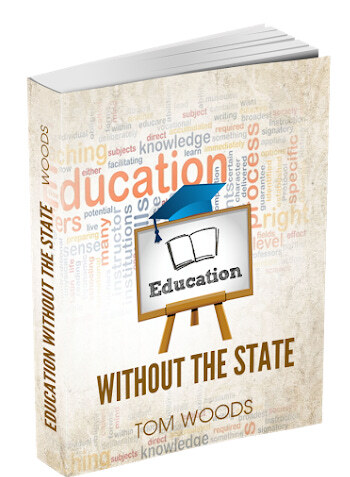Official Breakdown and Review: Education Without the State by Tom Woods - Part II

One of the greatest purposes behind my own fiction is to give readers a simple alternative to what’s been force-fed down their throats. While my upcoming young adult academy fantasy, Arcane Elemental Academy, is first and foremost intended to entertain, there are real-life inspirations behind it.
If there’s something I never enjoyed as a kid, it involved being coerced into hopping onto a school bus just so I could somehow exercise my “right” to walk through a building full of cinder block walls in a single-file line, in silence, and take part in classes whose subject matter I’d never use again.
The Libertarian Book Reviewer is a reader-supported publication. To receive new posts and support my work, consider becoming a free or paid subscriber.
Oh, and for those subjects I did show some interest in, yeah, I could only undertake them for a finite time each day. Then, it was off to study some material that I couldn’t have cared less about and, to this day, still couldn’t care less about.
Such is the case with government schooling, an institution that the political left has throttled, even if I’ve crossed some readers who like to pretend otherwise. That same political left took over my love for sports, but that’s a discussion for another time.
Anyway, the purpose of breaking down and reviewing works like Tom Woods’ Education Without the State serves two purposes. One, it’s nonfiction that inspires my own fiction, and two, as mentioned earlier, to provide you with a simple alternative that opposes what’s been routinely drilled into our heads since birth - and that’s the false notion that the state should “provide” education.
If you missed Part I, you can catch it here. And if you’re all caught up, let me break down and give you my honest thoughts on Part II. Oh, and now that I’m somewhat finding my groove with reviewing these smaller, to-the-point books, this one’s a little more in-depth than Part I, if you wanted an understatement.
Chapter 3How private schools educate the world’s poorIf you’re interested in listening to the transcript between Tom Woods and James Tooley, you can do so on Episode 238 of Tom Woods’ Podcast. It’s a show whose episodes I devour weekly and, alongside Human Action and Radio Rothbard, has become one of my go-to destinations.
Anyway, onto the breakdown. This one is a continuation of Woods’ conversation with Pauline Dixon, if you want the short answer. But, there was much more to be uncovered here, starting with the opening when Tooley stated how surprised he was by just how little people knew about how capable the world’s poor were of taking education into their own hands.
Personally, I love this opening, because it completely derails the assumption that people can’t improve their well-being without the state. Tooley also pointed out that this wasn’t a regional thing, but had been going on in parts of Africa, India, and China.
The kicker? Those schools were also performing better than government schooling, if there were any. Tooley conceded that the pay wasn’t great for these teachers, but the staff generally wanted to be there. And it’s very, very telling when those the schools employ are happy to be working there.
Tooley also stated that yes, the schools were recognizable. That’s also telling, as the general consensus could have easily been that these schools were held in random, unmarked buildings. But that wasn’t the case.
Thanks for reading The Libertarian Book Reviewer! This post is public so feel free to share it.
Best yet, Tooley had the statistics to back up the fact that the schools in these countries he discussed fared better than their government-run counterparts. No, that’s not a surprise to me, but to those buying into official narratives, it’d be a wake-up call. If you wanted further evidence, it’s something Tooley outlined in his book, The Beautiful Tree. And best yet, he noted these comparisons went beyond just test scores, and that’s huge.
The take on ChinaThis one intrigued me because lately, I’ve often thought of China as a wild card. Yeah, the regime and the entire CCP blow, yet they always seem somewhat tolerant of free markets in what I might call a sweet taste of irony.
And it seems like the private schools in China also operated in that gray area. They’re independent, and as Tooley said, “tolerated.” He also went on to talk about how the accessibility to government schools in these remote areas of China was kind of off the radar, necessitating the need for entrepreneurs to step in and provide a solution.
Well, you can guess what happened, I’m sure. They took action, and those remote villages had more convenient private schools to attend. Ditto for the “migrant population” that ventured into cities (like Beijing), who couldn’t get into government schools. Once again, the private sector had the answer.
While the government has had a “tolerance” for these schools’ existence, you can guess that they’re still required to spread the (presumably) CCP’s ideology. There are definite downers, but nevertheless, Tooley gave us a keen look-in that even in a place like China, private schools can prevail.
 Responding to common objections
Responding to common objectionsFirst, let me applaud Tom Woods here for the way he paraphrased the general objection:
“Their friends say, look, I understand we don’t want price controls on milk. We get that. But we do need government provision of schools, because otherwise everyone would be illiterate and worshiping Thor.”
I loved the “worshiping Thor” part, given the fact I rarely leave my home these days without my Thurisaz (ᚦ) rune necklace - Thor’s rune. Just thought I’d throw that out there. Anyway, back to the topic at hand.
Here’s a quick bullet list of what I picked up with Tooley responding to said objections. And, in many cases, I’m paraphrasing, but you’ll also see me mixing in my own thoughts.
Low-cost private schooling existed in the West before the government takeover
This alone gives us compelling evidence that government schooling isn’t necessary.
Tooley also brought up parents educating kids as natural as “feeding and clothing them.”
BIG PLUS HERE. In my own experience, my mother educated me well before she handed me off to the state when I was pre-school age, to the point I knew basic Spanish. And no, my mom has no ancestry in any Spanish-speaking country.
I was waiting for the objection of, “What about parents who won’t educate their kids?”
Tooley had a number on hand, and it was “maybe five percent in England and Wales in the nineteenth century.”
Ooh, and another favorite objection of mine: Equality, equity, and social justice
Public schooling doesn’t even remotely serve social justice, and Tooley said something similar.
Evidence? Hey, I’ve worked in areas that had money and areas that didn’t have money. You probably don’t need to guess which areas had the better schools.
Tooley also laid out an outline for helping the poor here in the West, but I think he answered that objection well throughout his discussion with Woods.
ThoughtsFor me, there was a lot of myth-busting going on here. Not only did Tooley find common denominators in different regions of the world; he also tore apart the argument for state-mandated education in the West.
This chapter alone could hand us a well-crafted argument that ultimately shows there’s no need for the state to stick its nose in education. Or, as I like to call it, indoctrination.
Chapter 4School vs. EducationOkay, let me just say that School Sucks is the absolute best name for a podcast ever. While I couldn’t find the actual podcast itself - keep in mind that this interview also took place more than a minute ago on Episode 303 - it’s still legendary in and of itself.
That said, I wanted to begin with a story: Back when I was in the fourth grade, this would have been the 2000-01 school year, Blink 182 just released a song called All the Small Things. Yeah, you’re welcome if I made you feel old. Well, I distinctly remember me and my friends replacing the lyrics of “truth care, truth brings,” with “school sucks, and things.”
Yeah, maybe I was rather aware of just how despicable state education was years before I graduated from high school in 2009. So, Mr. Brett Veinotte, thanks for the nostalgic moment! Veinotte also dropped the mic early in this interview, reminding us that real education doesn’t need to occur in what most would refer to as a school.
The Libertarian Book Reviewer is a reader-supported publication. To receive new posts and support my work, consider becoming a free or paid subscriber.
It’s chapters like these that make me mentally kick myself for not discovering Tom Woods’ podcast earlier. But it’s better to be late than never, right? “Self-directed, intrinsically motivated” are just two words (or phrases) Veinotte hit a home run with.
And it’s something I can relate to, with my day job at the time of this writing stemming from 1,000 percent self-direction and intrinsic motivation and exactly 0 percent from my own studies. Yeah, talk about wasting a few years of my life earning a piece of paper or two that said I passed a bunch of courses for about $30 grand.
What if a kid just isn’t interested in learning math, science, etc.?Veinotte dove into a story about a kid who was a fanatic of the TV show Ancient Aliens. While it would be rough to base a curriculum that stemmed from the show, Veinotte managed to find some interesting areas to study.
Astronomy
Evaluating evidence
Archaeology
Anthropology
Yeah, those few subjects alone would’ve made my own experience in government schools much more worthwhile. In fact, in the rare event when something exciting did occur when I was in middle school, the portion of my “education” I despised the most for various reasons, I can point to a pair of instances when it actually was fun:
Unit 2 of my fifth-grade science class, which discussed astronomy
The time in my sixth-grade history class when a classmate’s mother conducted a presentation. That woman happened to be an archaeologist.
A little about the School Sucks PodcastAs mentioned earlier, I couldn’t find a working link to this anywhere, so maybe I’m missing something. But, the conversation also turned to Brett Veinotte’s podcast, and something here caught my attention.
“So when I started the podcast in 2009, I blurted out I feel like the first 20 episodes: what my problems were with school, what I believed to be the hidden lessons of school—obedience, conformity, and as a result of that, a kind of political or philosophical or intellectual apathy. I wound up doing a big series right out of the gate about understanding politics, because I wanted people to understand that I wasn’t pursuing political solutions. I didn’t believe in the idea that the public schools could be reformed. We did a series on how kids are made to feel defective if they can’t conform to that environment of school, and some of the consequences of nonconformity, and how students could protect themselves from that.”
This quote sums up what I’ve read and heard from quite a few who have experience in working in the schooling sector, be it government/state-funded or private. That schools almost contain that hidden agenda while masquerading as a place of education, and that agenda, obviously, is what I bold-faced in the top half of Veinotte’s quip.
We can also agree that it’s a similar experience to what we all went through during our own days in government schools. I also like how Veinotte touched on the idea of ‘reform,’ as it’s been a word thrown around for quite a while.
“If only we could reform schools” is my way of paraphrasing it. Sadly, school reform, as we’ve seen, will benefit one group at the expense of another. Look no further than common core, critical race theory, and gender theory, and you’ll have caught my gist.
Other topics the show covered involved history, problems and solutions, productivity, logic, grammar, self-esteem, plus tidbits on homeschooling and unschooling. Overall, it sounded like a podcast that, while seemingly covering quite a few topics, to me looked like one that sat in a niche, before it expanded to what could be covered while remaining within that niche.
Takes on homeschoolingSomething I really liked from this section was that we also didn’t see Veinotte completely go to bat for homeschooling. Sometimes, when I listen to podcasts or indulge in audiobooks, they can be slanted more into a “homeschooling can do no wrong” sector, but this wasn’t the case for that.
While I would 1,000 percent rather roll with homeschooling than government schooling, it’s also nice to see someone discuss potential pitfalls such as, for example, some parents perhaps having too much on their shoulders in such a setting.
So, if you’re looking for a decent balance between the pros and cons of each, Chapter 4 in this book has you covered.
ThoughtsEarly on, Veinotte also talked about how we’ve become so conditioned as a society that education is something that occurs in an uncomfortable setting, that many who’ve gone through the process want nothing to do with it. He’s not wrong, and you only need to survey a few random people to draw that conclusion.

Heck, survey guests at the next Christmas party you attend, and I guarantee that you won’t get many favorable responses. Personally, the Sorting Hat put me in Ravenclaw (House of intellect, wit, learning, and creativity), so I guess that explains why the passion never died.



